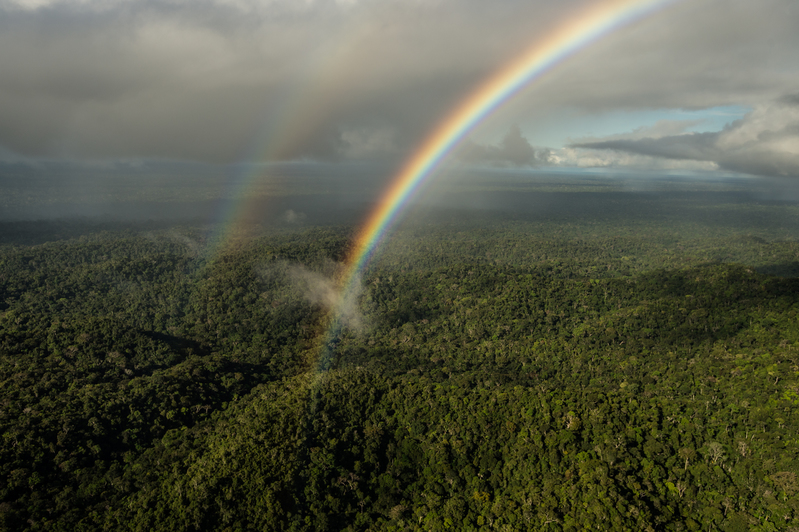An unprecedented initiative in Brazil, the SPA brings together dozens of scientists who have made a complete diagnosis for the world’s largest tropical forest. The priority: stop Amazon deforestation
The Science Panel for the Amazon (SPA), launched last year, brought together for the first time a wide range of scientists from all areas to look at the whole Amazon Basin and its biomes. A broad diagnosis of the physical, biological, biodiversity and socio-economics of the forest was made. The panel analyzed the entire ecosystem, focusing on a diagnosis and the necessary actions for the conservation and development of a sustainable Amazon.
What is the Amazon we want? What is the best socioeconomic development strategy for the Amazon? Bioeconomy? Extractivism? Intensive agriculture? Family agriculture? Mining? This is not an easy question or a single answer. The Amazon is highly heterogeneous and this means that solutions for the eastern Amazon may not be suitable for the Peruvian Amazon or the upper Rio Negro. We need to build sustainable development models that are ecologically sound, socially just, culturally inclusive, and supportive of economic prosperity. This development has to be aligned with the Sustainable Development Goals (SDGs).
The Amazon is part of a constantly changing planet. Importantly, what happens in the world affects Amazonia; and what happens in Amazonia affects the world. The well-being of those who inhabit the planet today and of future generations depends on its conservation.
The well-being of those who inhabit the planet today and of future generations depends on its conservation.
There is certainly still time to act. The work of the Science Panel for the Amazon has focused on highlighting synergies between different types of knowledge and an interdisciplinary approach to developing practical, integrated solutions. It shows that it is necessary to involve potential partners who share the vision of a protected and productive Amazon.
It is critical to maximize synergies between the different dimensions of sustainable development, recognizing the natural limits of Amazonian ecosystems, respecting human rights, deepening decentralized governance, combating illicit activities, strengthening partnerships for conservation, and advancing transformative development pathways.

To structure the solutions, the Panel focuses on three central axes: 1) Conserving, sustainably managing, restoring and remediating ecosystems; 2) Investing in a sustainable bioeconomy of standing forests and flowing rivers; 3) Empowerment and governance. The global socio-ecological crisis has raised awareness about the importance of “planetary health,” which aims to promote human prosperity and protect the basis of life on Earth in an integrated way.
Among the priorities, we have to achieve zero deforestation by 2028, as committed by the Brazilian government at COP26, stop the process of ecosystem degradation, and fight forest fires. Ensuring the integrity of hydrological systems, biodiversity and the fundamental role of the Amazon as a global climate regulator requires that at least 80% of forests remain standing.
In parallel to conservation, reforestation and restoration activities urgently need to be accelerated. To safeguard its ecological integrity, it is necessary not only to stop deforestation and degradation, but also to restore and remediate affected terrestrial and aquatic ecosystems.
It is also necessary to protect indigenous peoples, local communities, and their rights for social justice and conservation.
Advancing sustainable development paths, combining technology and science with traditional knowledge, is another challenge. Circular bioeconomy research and development needs to be transdisciplinary, as well as involve relevant social actors or stakeholders in the process. The emergence of a new bioeconomy of standing forests and healthy flowing rivers in the Amazon must be supported by ambitious policies based on the best available science and advanced technologies combined with traditional knowledge. Consistent investment in education, science, technology and innovation is of paramount importance.
Economically, it is necessary to mobilize funding and promote partnerships for conservation, restoration, and sustainable development. Illegal activities and regional and federal political conditions currently favor deforestation over conservation or restoration. The scale of the Amazon basin and the challenges it faces require ambitious, large-scale international financial development with public and private financial partnerships to promote and sustain restoration, conservation, forest management, development of sustainable value chains, payments for ecosystem services, and investment in education, science, technology and innovation.
The Amazon rainforest is a vital ecosystem for the entire planet and a heritage for all humanity. Although its stewardship lies first and foremost with the Amazon nations, this responsibility must also be shared globally.
We must mobilize financial support by advanced economies, as they generate most of the greenhouse gas emissions and contribute to deforestation and forest degradation through the importation of commodities associated with deforestation. Importantly, if we continue with fossil fuel burning, even if we zero tree felling, forest degradation of the standing forest through global warming could destroy it.
The “Amazônia Viva” (Amazon Alive) concept promotes the sustainable development and well-being of Amazonian peoples, conserving the Amazon’s unique resources, and advancing on a sustainable path that will reduce the risk of crossing dangerous tipping points. This is an urgent, feasible task with major co-benefits for our economy, for the Amazonian people, and for Brazil.
The opinions expressed in this article are the writer’s own.



